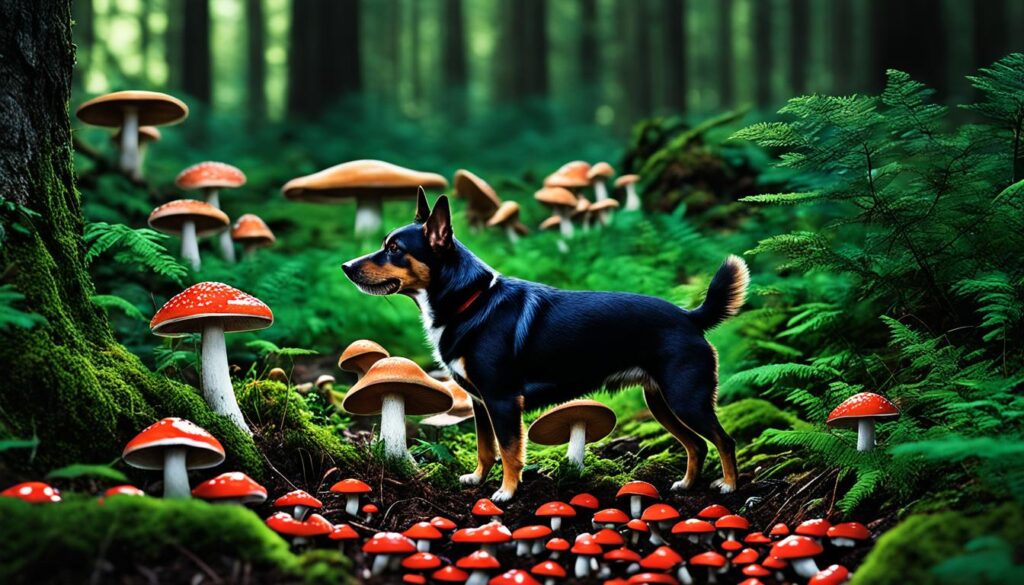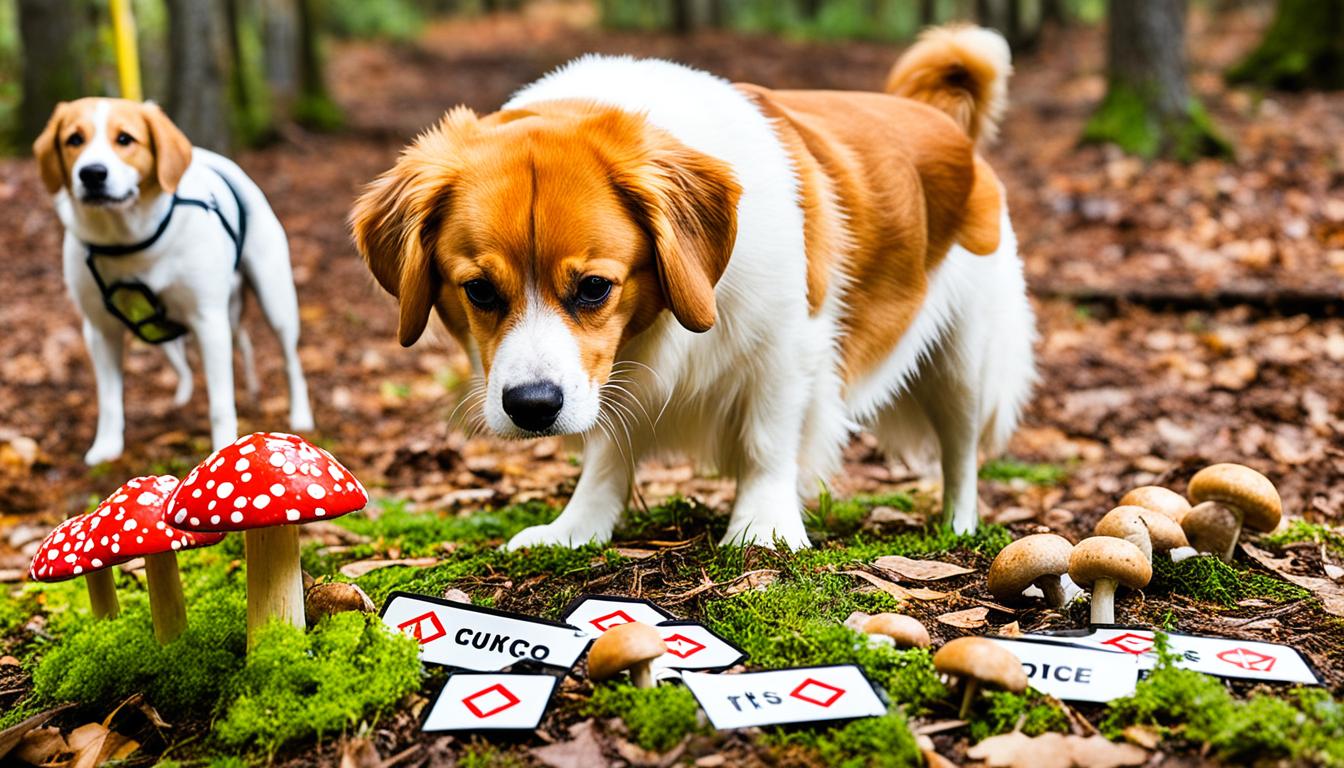As an Amazon Associate I earn from qualifying purchases.
Can dogs eat mushrooms? It’s a question that might have crossed your mind as you’ve watched your furry friend sniffing around the forest floor on your daily walks. I know it’s crossed mine. There’s something about the way they’re drawn to those little fungi that just piques our curiosity. But as a responsible dog owner, it’s important to understand that not all mushrooms are safe for our canine companions.
Growing up, I had a mischievous beagle named Max who always seemed to find a way to get into trouble. One day, while exploring the backyard, he decided to take a bite out of a wild mushroom. Within minutes, he started exhibiting strange symptoms, and I immediately knew something was wrong. Frantic, I rushed him to the vet, where they confirmed that he had ingested a toxic mushroom.
That experience made me realize just how important it is to be knowledgeable about the mushrooms our dogs encounter and the potential risks they pose. Mushrooms can be a double-edged sword, with some varieties being safe and even beneficial for our pets, while others can be highly toxic and pose a serious threat to their health and well-being.
In this guide, we will delve into the topic of dogs and mushrooms, exploring the risks involved in allowing them to feast on these fungi, the mushrooms that are safe for them to eat, the symptoms of mushroom poisoning, and how to safely incorporate mushrooms into their diet. Your furry friend’s health and safety are our top priorities, so let’s dive in and learn more about this fascinating and potentially dangerous culinary curiosity.
Key Takeaways:
- Not all mushrooms are safe for dogs to eat, and some can be highly toxic.
- It’s crucial to be able to identify safe mushrooms and avoid letting your dog consume wild mushrooms.
- Symptoms of mushroom poisoning can range from gastrointestinal distress to organ failure.
- If you suspect your dog has ingested a toxic mushroom, seek immediate veterinary treatment.
- Consult with a veterinarian before introducing any new food or supplement into your dog’s diet.
Can Dogs Eat Wild Mushrooms?
Wild mushrooms pose a significant risk to dogs. Many toxic mushrooms are difficult to distinguish from non-toxic ones, making it unsafe to allow dogs to eat any wild mushrooms. Even experienced mushroom foragers can make mistakes in identification. If a dog ingests a wild mushroom, it is important to seek veterinary treatment immediately. Veterinary treatment options for mushroom poisoning depend on the type of mushroom and the symptoms exhibited by the dog.
While dogs may be curious about mushrooms and their enticing smells, it’s crucial to keep them away from wild varieties. The potential consequences of wild mushroom ingestion in dogs cannot be overstated. Mushroom poisoning can cause various symptoms that range from mild gastrointestinal distress to life-threatening organ failure.
So, why are wild mushrooms so dangerous for dogs?
Wild mushrooms have an array of complex compounds that can be toxic to dogs. These compounds can lead to severe health problems, including liver damage, neurological issues, and even death. The problem is compounded by the fact that many toxic mushrooms closely resemble safe ones, making it incredibly challenging for even experienced foragers to differentiate between them.
What should you do if you suspect your dog has ingested a wild mushroom?
If you suspect your dog has eaten a wild mushroom, it is crucial to take immediate action and seek veterinary treatment. Don’t wait for symptoms to appear, as some toxic mushrooms can cause significant harm even in small quantities. It’s always better to be safe than sorry when it comes to mushroom poisoning in dogs.
The veterinary treatment for mushroom poisoning in dogs will depend on several factors, including the type of mushroom ingested and the symptoms exhibited by the dog. The veterinarian may induce vomiting to rid the body of any remaining toxins and administer medications to counteract the effects of the toxins. Supportive care, including IV fluids and medications to manage symptoms, may also be necessary.
Common Symptoms of Wild Mushroom Poisoning in Dogs:
- Vomiting
- Diarrhea
- Abdominal pain
- Lethargy
- Muscle weakness
- Yellowed skin
- Excessive drooling
- Loss of coordination
- Seizures
- Coma
If you notice any of these symptoms in your dog, don’t hesitate – contact your veterinarian immediately. Providing your vet with as much information as possible, including the type of mushroom and any observed symptoms, will help guide their treatment plan and improve the chances of a positive outcome.
Remember, when it comes to wild mushrooms and your furry friend, it’s better to be safe than sorry. Keep your dog away from wild mushrooms, and if ingestion does occur, prompt veterinary intervention is essential. Your quick action can be a lifesaver for your beloved canine companion.
| Type of Mushroom | Potential Symptoms | Veterinary Treatment |
|---|---|---|
| Amanita phalloides (death cap) | Severe gastrointestinal distress, liver damage, organ failure | Induce vomiting, supportive care, liver protection medications |
| Galerina marginata (deadly Galerina) | Liver toxicity, neurological issues | Induce vomiting, supportive care, liver protection medications |
| Amanita gemmata (jeweled deathcap) | Severe gastrointestinal distress, liver damage, organ failure | Induce vomiting, supportive care, liver protection medications |
| Amanita muscaria (fly agaric or Deadly Agaric) | Neurological issues, liver toxicity | Induce vomiting, supportive care, liver protection medications |
| Gyromitra spp. (false morel) | Gastrointestinal distress, liver toxicity, seizures | Induce vomiting, supportive care, liver protection medications |
| Inocybe spp. | Gastrointestinal distress, liver toxicity, seizures | Induce vomiting, supportive care, liver protection medications |
| Clitocybe dealbata | Severe gastrointestinal distress, liver damage, organ failure | Induce vomiting, supportive care, liver protection medications |
What Kinds of Wild Mushrooms Are Toxic to Dogs?
In the vast world of fungi, there are several treacherous mushrooms that can pose a grave danger to our furry friends. These toxic mushrooms for dogs should be avoided at all costs. Let’s take a closer look at some of the most dangerous wild mushrooms for dogs:
| Mushroom Name | Common Name |
|---|---|
| Amanita phalloides | Death Cap |
| Galerina marginata | Deadly Galerina |
| Amanita gemmata | Jeweled Deathcap |
| Amanita muscaria | Fly Agaric or Deadly Agaric |
| Gyromitra spp. | False Morel |
| Inocybe spp. | Inocybe |
| Clitocybe dealbata | Deadly Dapperling |
These toxic mushrooms encompass a wide range of species, each with its own distinct dangers. Ingesting any of these mushrooms can lead to severe symptoms, from gastrointestinal distress to organ failure and even death. As responsible pet owners, it is crucial to keep a keen eye out for these dangerous wild mushrooms and prevent our beloved dogs from coming into contact with them.

It’s important to remember that visual identification of these toxic mushrooms can be challenging, even for experienced foragers. To ensure the safety and well-being of our four-legged companions, it’s best to err on the side of caution and avoid all wild mushrooms when it comes to our dogs’ diet.
Symptoms of Mushroom Poisoning in Dogs
When it comes to mushroom poisoning in dogs, recognizing the symptoms is crucial for prompt intervention. The signs of mushroom poisoning can vary depending on the type of mushroom ingested, but there are some common symptoms to watch out for:
- Vomiting: Dogs may experience episodes of vomiting as their body tries to expel the toxic substances.
- Diarrhea: Loose stools or diarrhea can occur as a result of mushroom poisoning.
- Abdominal pain: Dogs may exhibit signs of discomfort or tenderness in the abdominal area.
- Lethargy: A general lack of energy and increased sleepiness may be observed.
- Muscle weakness: Dogs may have trouble standing, walking, or engaging in normal physical activities.
- Yellowed skin: Jaundice, characterized by yellow discoloration of the skin and eyes, can indicate liver damage.
- Excessive drooling: Dogs may drool excessively due to gastrointestinal irritation.
- Loss of coordination: Lack of balance and stumbling can be signs of neurological effects from mushroom toxins.
- Seizures: In some cases, dogs may experience seizures or convulsions.
- Coma: Severe poisoning can lead to a coma-like state where the dog is unresponsive.
If you suspect your dog has ingested a toxic mushroom and you notice any of these symptoms, it is essential to seek immediate veterinary care. Remember, the earlier the intervention, the better the chances of a positive outcome for your furry friend.

Treating Mushroom Poisoning in Dogs
If your dog has ingested a toxic mushroom, don’t panic! Remember, speed is of the essence. Immediate veterinary treatment is crucial to ensure your furry friend’s well-being.
The first step is to get in touch with your veterinarian or a 24-hour emergency veterinary clinic. Describe the situation and provide any relevant information, such as the type of mushroom your dog ingested and the time since ingestion.
Your veterinarian may advise you to induce vomiting if the ingestion occurred within the last two hours. This helps expel any remaining mushroom material from your dog’s stomach, minimizing further absorption of toxins. Please note that inducing vomiting should only be done under veterinary guidance, as it can be dangerous or ineffective in certain situations.
“Inducing vomiting? What an odd talent!”
Did You Know? Dogs have a natural gag reflex that allows them to vomit easily. Cats, on the other hand, have a much stronger resistance to vomiting.
After vomiting has been induced, your veterinarian may administer activated charcoal to help bind and prevent absorption of any remaining toxins in your dog’s stomach. This can reduce the severity of symptoms and aid in the elimination of harmful substances.
Depending on the symptoms your dog is experiencing, additional supportive care may be provided. This can include intravenous fluids to maintain hydration, medications to control vomiting or diarrhea, and interventions to manage any organ dysfunction.
Monitoring the Recovery Process
Unfortunately, some toxins found in mushrooms can cause a profound effect on the central nervous system, leading to a non-fatal, coma-like sleep. Your dog may require close monitoring until they wake up. Rest assured, most dogs recover with appropriate veterinary care and supportive treatment.
Once your dog starts showing signs of improvement, it’s crucial to prevent any future mushroom ingestion. Take measures to ensure your environment is free of toxic mushrooms, such as inspecting your yard regularly and consulting a professional if necessary.
Remember: Prevention is better than cure!
Can Dogs Eat Store-Bought Mushrooms?
When it comes to store-bought mushrooms, like white button, cremini, and portobello mushrooms, you can breathe a sigh of relief – they are generally safe for dogs to eat. But hold on to that leash! Before introducing these fungi to your furry friend’s diet, it’s essential to exercise caution.
Store-bought mushrooms often come prepared with an array of seasonings and ingredients that may not be ideal for your canine companion. They can be cooked with oils, butter, and even contain harmful ingredients like garlic and onions, which can be toxic to dogs. So, while the store-bought varieties themselves are typically safe, it’s the added flavors and seasoning that can put your pet’s health at risk.
Remember, your pup’s digestive system is not the same as yours. While mushrooms might be a tasty treat for you, certain seasonings and ingredients may have adverse effects on your furry friend’s well-being. So, keep those mushroom-infused dishes away from your pup’s food bowl and opt for other dog-friendly treats instead!
The Seasoning and Ingredient Dilemma:
| Seasonings | Ingredients |
|---|---|
| Garlic and Onion Powder | Oils and Fats |
| Herbs and Spices | Salt and Sodium |
| Artificial Flavorings | Sauces and Condiments |
As you can see from the table above, some of the seasonings and ingredients commonly used with store-bought mushrooms can have negative effects on your dog’s health. Garlic and onion powder, for example, can lead to digestive upset and, in large quantities, even cause dangerous anemia in dogs. Oils and fats can cause pancreatitis, while excess salt and sodium pose risks to your pup’s cardiovascular health.
So, as much as your pup may beg for a nibble of those savory mushrooms from your plate, it’s best to avoid sharing them. Your furry friend will be much happier and healthier indulging in a treat that’s specially made for dogs.
Can Puppies Eat Mushrooms?
Feeding mushrooms to puppies can be quite a risky endeavor. Their small bodies and weaker immune systems make them more susceptible to the potential dangers of mushrooms. Puppies have a knack for finding and munching on things they shouldn’t, including poisonous mushrooms. As they explore the world with their curious mouths, they may develop a fondness for mushrooms, leading to confusion when trying to prevent them from consuming wild varieties.
While store-bought mushrooms are generally safe for puppies, it’s important to note that there is no compelling reason to include mushrooms in their diet without a specific health benefit. It’s always better to err on the side of caution when it comes to the health and well-being of your furry friend.
Conclusion
In conclusion, when it comes to dogs and mushrooms, it’s best to err on the side of caution. While some store-bought mushrooms can be safe for dogs to enjoy, the potential risks of allowing them to eat wild mushrooms are too great. The variety of toxic mushrooms and the severity of their effects on canine health underscore the importance of keeping mushrooms out of your furry friend’s diet.
Symptoms of mushroom poisoning can range from gastrointestinal distress to organ failure and even death, making it crucial to take any suspected ingestion seriously. Immediate veterinary treatment is necessary to ensure the best chances of a positive outcome. Remember, if you’re ever in doubt about the safety of a particular mushroom or any food for your dog, consult with a veterinarian for guidance.
When it comes to feeding mushrooms to dogs, it’s generally safer to avoid it altogether, especially if the mushrooms are prepared with seasonings or ingredients that can be harmful to canines, such as garlic and onions. As responsible pet owners, it’s our duty to prioritize the safety and well-being of our furry companions and make informed decisions about their diet. Always remember to consult with a veterinarian before introducing any new food or supplement into your dog’s routine.
FAQ
Can dogs eat mushrooms?
Are wild mushrooms safe for dogs?
What kinds of wild mushrooms are toxic to dogs?
What are the symptoms of mushroom poisoning in dogs?
How is mushroom poisoning in dogs treated?
Can dogs eat store-bought mushrooms?
Can puppies eat mushrooms?
Source Links
- https://www.akc.org/expert-advice/nutrition/can-dogs-eat-mushrooms/
- https://www.purina.co.uk/articles/dogs/feeding/what-dogs-eat/can-dogs-eat-mushrooms
- https://www.forbes.com/advisor/pet-insurance/pet-care/can-dogs-eat-mushrooms/
As an Amazon Associate I earn from qualifying purchases.

